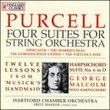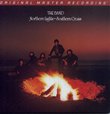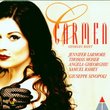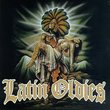| All Artists: George Frideric Handel, Nikolaus Harnoncourt, Jochen Kowalski, Anthony Rolfe Johnson, Alastair Miles, , Arnord Schoenberg Chor Roberta Alexander, Anton Scharinger, Concentus musicus Wien Angela Maria Blasi Title: Handel - Samson / R. Alexander · Venuti · Kowalski · Rolfe Johnson · A. Miles · Scharinger · Harnoncourt Members Wishing: 0 Total Copies: 0 Label: Teldec Release Date: 2/8/1994 Genre: Classical Styles: Opera & Classical Vocal, Historical Periods, Baroque (c.1600-1750) Number of Discs: 2 SwapaCD Credits: 2 UPC: 090317487120 |
Search - George Frideric Handel, Nikolaus Harnoncourt, Jochen Kowalski :: Handel - Samson / R. Alexander · Venuti · Kowalski · Rolfe Johnson · A. Miles · Scharinger · Harnoncourt
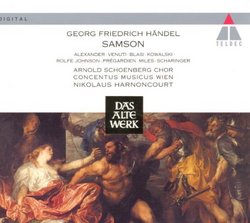 | George Frideric Handel, Nikolaus Harnoncourt, Jochen Kowalski Handel - Samson / R. Alexander · Venuti · Kowalski · Rolfe Johnson · A. Miles · Scharinger · Harnoncourt Genre: Classical
Nikolaus Harnoncourt's Handel oratorios have had mixed success. The best of them is probably Belshazzar, but this isn't bad either. The problem is that the performance is cut (which is pointless for home listening, however... more » |
Larger Image |
CD DetailsSynopsis
Amazon.com Nikolaus Harnoncourt's Handel oratorios have had mixed success. The best of them is probably Belshazzar, but this isn't bad either. The problem is that the performance is cut (which is pointless for home listening, however desirable in live performance), and it faces brutal competition from two other superb versions--Raymond Leppard's on Erato, and Harry Christophers's on Collins. Under the circumstances, this set is a clear third choice. --David Hurwitz Similar CDs
|
CD ReviewsNot Quite the *Samson* We've Been Looking For Johannes Climacus | Beverly, Massachusetts | 09/12/2007 (4 out of 5 stars) "*Samson* bids fair to being Handel's most intensely dramatic oratorio. Samson's confrontations with Dalila and Harapha, the great Act II finale in which the Jews and Philistines enter into what amounts to a Baroque "Battle of the Bands," and the Act III recitative interrupted by a "Symhony of Horror and Confusion" represent some of the most remarkably vivid scene-painting in all of music. Yet this revolutionary work (which inspired Haydn's *Creation*) awaits a recorded performance truly worthy of its astonishing invention. Harnoncourt's version, taken from a live performance with an international cast, can't be accused of being bland, staid or anything less than dramatically effective. As always, Harnoncourt is predictable in his unpredictability--a characteristic well suited to this kaleidoscopic work. Whether it be Samson's anguished meditation on his predicament ("Torments, Alas!"; "Total Eclipse!"), the Philistines' riotous orgy, or the Israelites' thunderous plea for liberation ("With thunder arm'd), Harnoncourt manages to convey Handel's sharply contrasting moods and extravagant musico-dramatic gestures. What Harnoncourt fails fully to realize are the euphonious, indeed sensual aspects of Handel's music--and that holds not only for Dalilah's seduction scene, but also for some of Micah's prayerful arias and several of the more evocative choruses (e.g., "O first-created Beam"). True to form, Harnoncourt is a "mannerist" interpreter of Handel--and none the worse for that: "Baroque" means "bizarre" after all, and mannerism was part of the package from the time of Monteverdi. Yet there is a certain restraint, a classicism, and a lyricism in Handel which Harnoncourt doesn't fully appreciate. The cast, too, is a mixed blessing. Alexander sings beautifully, if with a certain detachment, as Dalilah. Venuti as the Israelite Woman and Blasi as the Philistine Woman/Attendant also make positive contributions, despite their not-so-perfect English diction. Venuti gets to sing the one chestnut from the oratorio--"Let the bright Seraphim" (made famous by Joan Sutherland)--and her spectacular vocalism almost rivals Dame Joan. Almost. On the other hand, Rolfe-Johnson was having a bad day (or evening) when this recording was taken down; he strains to sound heroic, but ends up sounding. . .well, just strained. Over the long haul--and it is a long haul because Micah has quite a lot of music to sing--Jochen Kowalski proves to be a trial to the ear. The countertenor voice is not intrinsically unpleasant, but as employed here it lacks focus, agility, and suffers occasional lapses of intonation. Oh, for the days of Helen Watts! The other soloists are pretty good, though hardly exceptional. As usual, the Arnold Schönberg choir acquits itself splendidly--they are one of the most positive assets to this performance. So, in the end, I cannot endorse this recording unequivocally. It has many virtues, but the weaknesses (particularly in the lyrical music and in the title role) do not make this a fully worthy successor to the (dare I say?) "classic" Karl Richter version (once available as a DG import), despite Richter's now-dated views on late Baroque performance practice. Richter had the incomparable Alexander Young as Samson, a superb Dalilah, and a choir which (despite a trace of German accent) proves riveting in every one of their varied exploits. One listen to Richter's rendition of the chorus, "Hear, Jacob's God!" will convince you how much more there is to Handel's score than . . . mannerism." Well sung and well produced, excellent! Johannes Climacus | 05/07/1999 (5 out of 5 stars) "If you like Handel and Roberta Alexander, this CD is a great marriage of both! The merge of the orchestra and voices is excellent and well thought out. The singing was superb and inspiring. This is an excellently produced CD."
|

 Track Listings (25) - Disc #1
Track Listings (25) - Disc #1